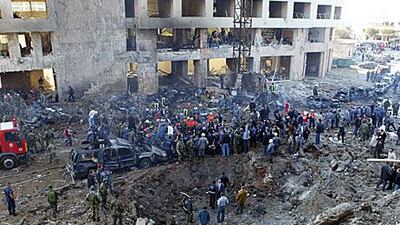BEIRUT // A Syrian judge has complicated the efforts of Lebanon's prime minister to smooth relations with Syria by issuing arrest warrants for dozens of prominent Lebanese officials.
The warrants were issued on Sunday night for 33 people associated with the investigation of the murder in 2005 of Rafiq Hariri, the father of the current prime minister, Saad Hariri.
Those named include advisers to Saad Hariri, some of Lebanon's most senior police and judicial officials, and prominent journalists.
The warrants were issued on behalf of Jamil al Sayyed, a former intelligence official who spent four years in jail in Lebanon on suspicion of having helped Hariri's assassins.
He and three other men in custody were released in April 2009 because of insufficient evidence.
Mr Sayyed alleges that Saad Hariri and his advisers conspired to place the blame on Syria and its Lebanese allies, including Mr Sayyed and three other security officials.
The "Four Generals", as they are commonly known, were jailed on charges that they helped to assassinate the elder Hariri on behalf of Syria. The charges were dropped.
The head of Lebanon's police, Ashraf Rifi, spent yesterday dismissing rumours that Interpol would pursue extradition for any of those indicted, who include Mr Rifi himself, Detlev Mehlis, the German prosecutor who once headed the Special Tribunal for Lebanon (STL), and Hani Hammoud, an adviser to Saad Hariri.
Mr Rifi said in an interview he believed Interpol would not honour such “politicised” indictments. He said a warrant issued by Syria for the arrest of the Lebanese Druze politician Walid Jumblatt was never enforced internationally.
One Lebanese police officer said that if Syria wanted to “suddenly start cooperating with Interpol, I have no doubt Israel would be happy to offer warrants for the Hamas leader, Khalid Meshaal, or any of maybe 1,000 people wanted in Israel, Europe or the United States that openly live in Syria”.
One person named in the warrants, Marwan Hamadeh, a member of the Lebanese parliament who has repeatedly accused Syria of killing Hariri, said: “For me, at the judicial and legal level, these warrants are equal to zero.”
The prime minister, Saad Hariri, did not respond publicly to what is widely seen in Beirut as an attack on both his ruling coalition and his recent insistence that the tribunal continue its work despite widespread concerns that it will indict members of Hizbollah.
Mr Hariri, a Sunni, had recently apologised for statements in which he made “politically motivated” accusations towards Syria in the wake of his father’s death. But the issuing of the warrants was widely seen as a sign that the reconciliation between Syria and Mr Hariri and his allies in Saudi Arabia has not succeeded.
The decision to indict the officials stems from a belief in Damascus that while Saudi Arabia has been willing to reconcile, its allies in Lebanon have not. Anonymous Syrian officials, who appeared to be speaking on behalf of the regime, said that the move was intended to push Mr Hariri into more decisive action to investigate the “false witness” issue raised by Mr Sayyed and to stop Lebanese support for the STL.
Many in the region believe that an indictment of Hizbollah for the murder of a prominent and well-liked Sunni leader could lead to sectarian violence in Lebanon.
A close ally of Mr Hariri, the MP Ahmed Fatfat, said that to be named in a warrant by the Syrian regime was like having “medals on the chest” of any patriotic Lebanese and that the timing of the warrants, which were issued on the same day as Lebanon’s justice minister delivered a report on the issue to the cabinet, was “political par excellence”.
A cabinet meeting last night in Beirut was expected to address this latest development, as well as continue talks over the 2011 budget, which includes Lebanon’s portion of the funding for the STL.
In a statement that went unnoticed at the time, a pro-Syrian newspaper based in Beirut, Al Diyyar, warned more than a week ago that Syrian authorities were running out of patience with the investigation by the justice minister, Ibrahim Najjar, and might act on their own.
In a story dated September 25, the paper said Syrian officials were waiting for the proper time to indict much of Lebanon’s political elite for failing to properly investigate the anti-Syrian charges.
“If the Lebanese judiciary does not comply with the Syrian demand, then Syria will take the appropriate measures to have Interpol issue arrest warrants for those individuals,” the newspaper reported at the time.
mprothero@thenational.ae

